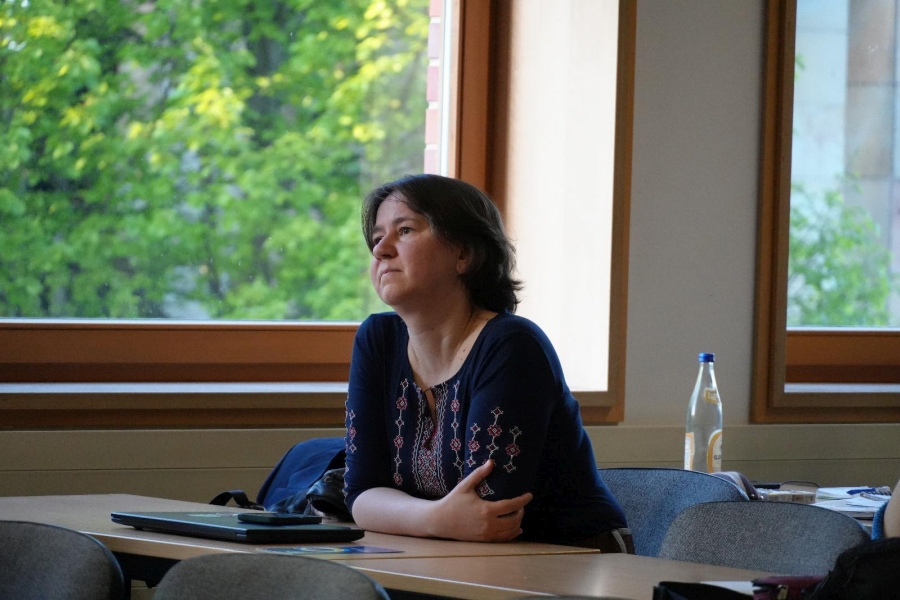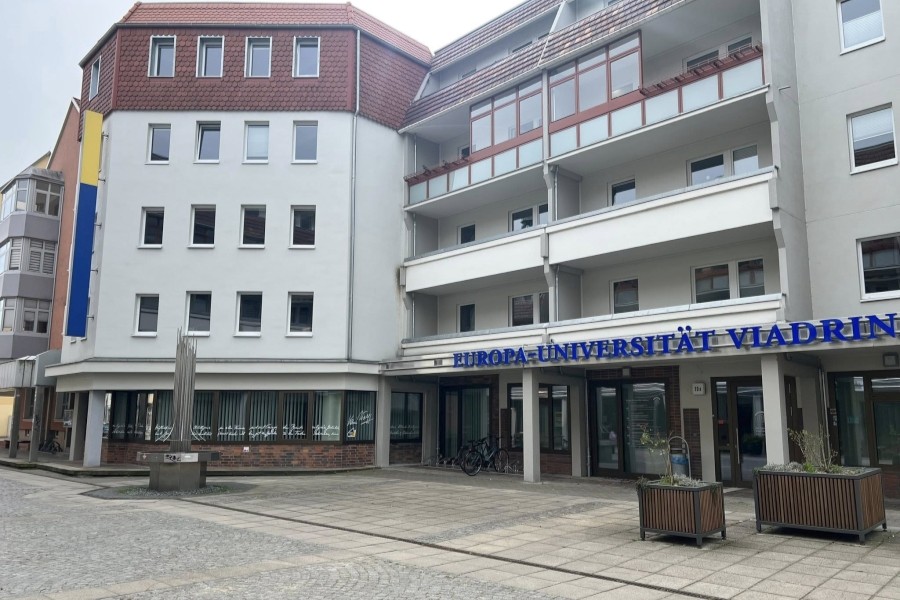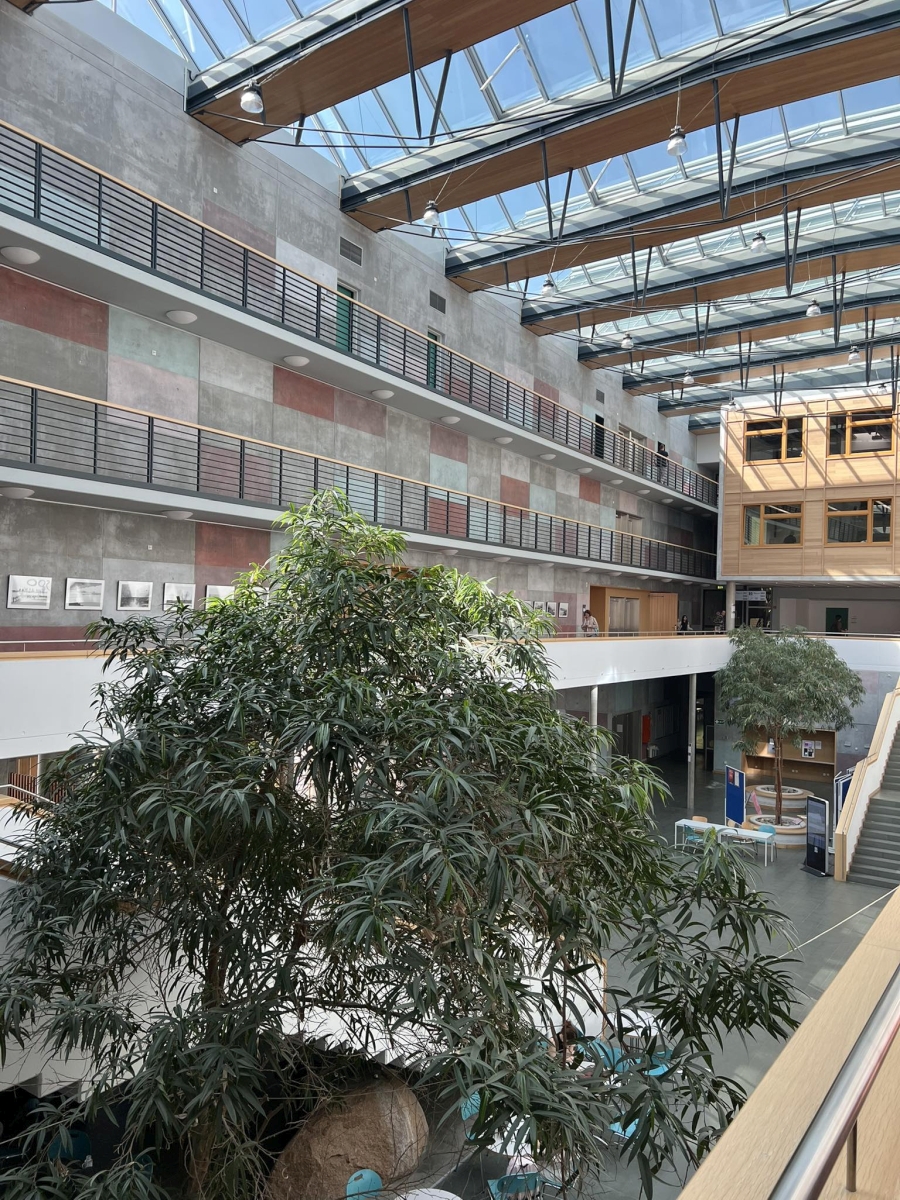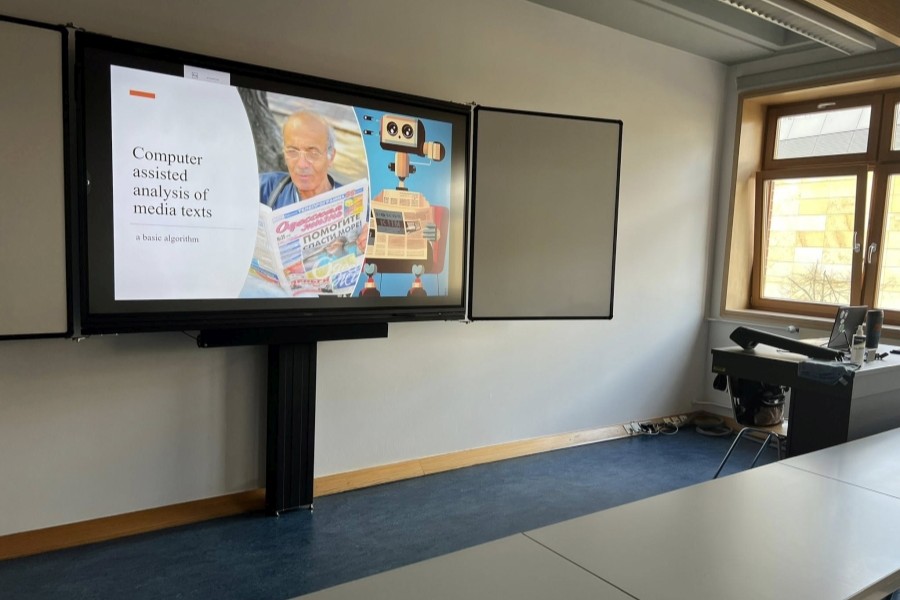What German and Ukrainian universities can learn from each other: observations of a journalism professor
Students in German universities are more independent and motivated to study, while in Ukrainian ones — more prone to experiment, says Nataliia Steblyna, a professor of journalism at Donetsk National University named after V. Stus.

Recently, the European academic environment has grown more interested in our experience, history, European integration prospects, and resistance to Russian aggression. Programs involving researchers and lecturers from Ukraine have begun to appear, including the Competence Network Interdisciplinary Ukrainian Studies (KIU) at the European University Viadrina (Frankfurt (Oder), Germany). This is a four‑year project, whose goal is ‘to strengthen research related to Ukraine, teaching, networking and exchanges’. Researchers from Ukraine and other countries can apply. Participants receive a scholarship and incredible opportunities for advancing their research, joint projects, and publications. There's also a school for doctoral students whose research is connected with our country. The scientific coordinator of the program is Dr. Susann Worschech, a passionate advocate for Ukraine, who has studied our civil society, democratization, and related topics for 20 years.
I learned about the call for applications to KIU through an acquaintance on Facebook. I filled out several forms (course descriptions, resume, publications) — and a month later I received an invitation.

From April to July 2025 I taught three courses as the first guest KIU lecturer. Many things there impressed me pleasantly. Here’s what we in Ukraine could adopt to bring our teaching and learning closer to the European standard, and what we do better than in a German university — and there are such things too! — I’ll talk about it further.
There is no correlation between students and salary level
One of the aspects that saddens me most about higher education in Ukraine — and which my German colleagues can’t believe — is that our departmental workload, salaries and corresponding wages depend on the number of students. Let’s face it: in such a case, neither the departments nor faculties benefit from expelling students, especially if the specialty is unpopular, groups are small, or the faculty is in a risk zone. Over time, students understand how everything works, and lose motivation to learn: either way they will pass the exams.
In Germany it's different. My colleague Olesia Lazarenko, a teacher of Ukrainian as a foreign language at the Language Center of Viadrina, says: there the teachers have a fixed salary, and their pay depends on experience, academic achievements, and the university’s location. The number of enrolled students doesn’t matter. Still, there must be at least five students in a group, otherwise the course is cancelled, Olesia adds.
At Viadrina, 10–15 students enrolled in each of my three courses. For us, if the courses are elective, these are very small groups. And in Germany colleagues said: ‘It’s quite a turnout’, meaning, ‘you have so many students.’ At KIU they helped in every way to promote the courses. Before the semester began, they conducted an interview with me for the university website, and at the start of the term we, with student assistants in the program, distributed flyers in university buildings.
Olesia Lazarenko doesn’t worry about the number of students: ‘Yes, I don’t have as many as, for example, those wanting to study Spanish, but I highly appreciate each one of them.’ Recently in her center they managed to get the right to issue official certificates confirming proficiency in Ukrainian language. Thus, Viadrina became the first university in Germany to certify the Ukrainian language.
Flexible curriculum
I was advised to design each of my courses for three, six, and nine credits. The content of the course stayed the same, but the amount of homework and final assignments differed. For example, for a course on contemporary Russian propaganda, for three credits I asked students to record a short video blog; for six — an expert interview; for nine — a mini‐lecture.
The student study plan is flexible. As Severyna Yakubych, a bachelor’s student at University Viadrina, explains: ‘Bachelor’s has 180 credits and is allotted six semesters, thus 30 credits per semester. In general, you can choose more or fewer credits per semester if you wish. Just understand: if you take fewer, your study period potentially stretches, or in subsequent semesters you will have to catch up.’ According to Severyna, there are very many who study beyond six semesters. If a student has extended the program, by the end of the tenth semester the university asks about their plans for completion. They may also be asked to vacate dormitory space.
I also was interested how students who work manage. At my university in Ukraine, if you work in the field, you can get an individual schedule, not attend lectures, but every two weeks you must send in homework. A student at Viadrina cannot come to an exam saying they did not manage an assignment or missed lectures due to work. ‘How to count the course complete, if a student has more than three absences? If the student skips classes, they cannot properly master the course,’ they explained to me before the semester.
Those who work full time are not allowed to take 30 credits in a semester, Severyna says. Such students must take fewer so as to learn well and combine this with work, the university thinks.
Also, according to Severyna, Viadrina has many elective courses. ‘We can study in one program, but intersect in only one required course — introduction to cultural studies. That's it. Then you choose two majors from four offered, and you need to pass admissions to those disciplines. Then there is also the requirement to complete one other introductory course to those disciplines. And from then on it depends on the chosen discipline.’
So students build their own program and choose how deeply they want to study a particular course. The only downside in this system, according to Severyna, is the absence of the student groups that we are familiar with. And for some, studying in a group, when everyone prepares for an exam or writes a term paper, is more convenient because it gives extra motivation.
Students are more motivated
In Ukraine I sometimes have the impression that my courses are interesting only to me and maybe two or three students. Of course, during war learning may not be the first priority. But no matter how much you improve courses, add games, interactivity, in the end it practically doesn’t show any effect.
At Viadrina the situation is opposite.
I was initially surprised that students take very detailed notes in my classes and ask to add links to resources I mentioned during the lecture. Students really want to use all this. Also, they constantly reminded me to upload presentations in Moodle. In one of the courses, where I talked about using computer programs for analyzing media texts, students recorded editing of code and running of the program so as to try later at home. If something didn’t work, they stayed after class — and we worked on it together. I also constantly replied to emails where they asked something to be clarified.
At the first class I asked my students why they are here. Some said that this course will help in writing a thesis. But that’s just one of the reasons for much greater attention to study.
Severyna Yakubych explains: there is no direct connection between course choices and the thesis. What matters first is personal interest. ‘First, I took courses from the linguistics module that interested me (and used orientation to number of ECTS in those modules), then I closed what I was missing in other modules,’ says Severyna. However, in Viadrina students themselves choose the topic of their thesis, and the courses they take can help by giving useful knowledge.
According to Olesia Lazarenko, usually her students clearly understand why they need to study her course: someone wants to communicate with friends or partners, someone is getting married. There are scholars interested in Ukraine or Eastern Europe. In any case it is not about choosing the course or getting a degree for parents or for ‘just because.’ Learning is tied to the desire to achieve a certain pragmatic outcome. Thus, lecturers are motivated not just to retell something from a book, but to create knowledge based on their own developments: so that the course is interesting and unique — and people enrol.

Diversity
My host university is located on the border between Germany and Poland. You cross a bridge over the Oder — and you are in another country. The university’s motto in Latin is ‘Ex oriente lux’, meaning ‘Light from the East.’ And the light here is not just a metaphor for the sunrise, but also reflects the mission of the university — to be a bridge between East and West. And in the classroom, you see confirmation of fulfilling this mission. Because the groups are international. Mostly my students were from France, Germany, Poland, Ukraine. Some from Pakistan, South Korea, Georgia. This is reflected in the menu in the cafeteria: dishes originate from different countries. During breaks you hear a mix of languages; students easily switch between English and German or French. Ukrainian students, besides of course Russian, know English and German. The university’s requirement for those two languages is level C1.
This multinationality allows constant use of context from different countries and to test whether theories or models considered hold in those conditions. So, in class we first analysed techniques of influence of Russian propaganda, and then compared them with those used during the war between India and Pakistan. One student prepared a wonderful video with clips from Indian news where to create a fitting emotional background, TV journalists during an air‐raid alert turned on the signal. Besides this, we examined how populism works in different countries, how similar and different political manipulations are, recalled pro‑Russian politicians in Poland and Georgia, compared how Russian propaganda attacks Macron and Merz.
Yes, issues of diversity, especially in the context of migration, are not simple for either German or Polish society. On that same bridge across the Oder, police and border guards from both countries stopped dark‑skinned people to check documents, whereas others could pass freely. In summer on the Polish side representatives of the organization Ruch Obrony Granic (Border Defence Movement) held rallies, spreading stereotypes about migrants as potential criminals. However, in the university, representatives of different nationalities could feel free.
For teaching and research, a multinational context is a significant advantage. I, for example, saw that scholars from Germany, Lithuania, France, Poland and other EU countries are interested in Ukrainian studies. Likewise, there was great interest in Ukraine even among my students. I showed them excerpts from Emma Antonyuk’s blog about Russian prisoners, translated messages from anonymous Telegram channels about night drone attacks by Russia, snippets from newspaper publications, television stories. Very interesting was also our experience of countering Russian propaganda, informational‑psychological operations, fact checking of Russian disinformation and fakes — we have something that can attract both researchers and students.
And what about bureaucracy?
Throughout the semester I did not fill out a single paper. I wasn’t asked for a report about evolution of the educational program, service notes, reports for business trips, updated self‑analysis, syllabus by a new template, filled out vacation schedule. I didn’t submit any data via various templates, didn’t call students to ask them to write applications. I didn’t make promotional videos, didn’t update websites and department pages in social media.
I simply taught. So, I could spend all day thinking about which image is better to begin a class with, to set the right atmosphere for understanding a specific topic. I was eagerly waiting for students’ homework and happily grading them. I edited short educational videos. Created memes.
Once I needed to reschedule two classes due to a conference. It turned out, to do this you don’t need to fill tons of paperwork and get signatures in various departments. You simply arrange it with students. Because your course is your responsibility.
I never visited the dean’s office. And the dean’s office never bothered me, for which I am very grateful.
According to Olesia Lazarenko, at Viadrina there are teaching staff and academic staff. Both types teach, and the latter also do research. Olesia, who has experience in both roles, says that the bureaucratic work is not very different. All data about teaching — course descriptions, student grades — are entered into a special electronic system. And that’s it. Scholars also report on conferences, articles, seminars and other events.
In Ukraine, however, the hellish educational bureaucracy takes about 80% of my working time. We are constantly reporting on something, re‑doing documents according to new templates… partly this is the legacy of the Soviet system, where for everything someone must be responsible with a piece of paper. Partly — our poverty. When there is work but it is not paid, yet it cannot be left undone because otherwise the university simply cannot function. In Germany that would be incomprehensible, because everyone — from professor to assistant — works within agreed hours. If overworked — you go on vacation.
What is better about us?

In my application I specified that for one of my courses at Viadrina I needed a computer lab. However, they did not give me one. And students came to class with their own laptops. At first sessions — it was just hell, because coding in Python has certain specifics depending on the operating system. Modules and libraries installed differently on different computers. Some did not install at all, no matter what. But this was very helpful: my student Oleksandr helped, and in class we would together show how it was supposed to work, to the other students. Over time we got a great atmosphere where the student whose setup worked would help neighbours.
In my Ukrainian university getting a computer lab for one’s discipline is not a problem at all. And that despite the fact that my university lost almost everything when relocating. Also, if during accreditation students say that they didn’t have a computer lab for a discipline where it was necessary, that will be a serious minus. Of course, it should be noted that my guest lectures were taught at a cultural studies faculty and there was no journalism or communications program; but still...
Also, in my observations, we pay more attention to students. Students at Viadrina are more independent and rely on themselves. Regarding my university, I remember how one of our graduates said: ‘With you I felt like in a greenhouse, because you constantly took care of me.’ In our system there still applies: if a student doesn’t learn — the teacher is to blame. If a student misses classes — the department is responsible, because it didn’t supervise, the curator didn’t call the parents. Besides, our attention to students leads to more interactivity of our courses. And, as it seemed, Ukrainian students are more prone to experiments.
Another positive feature of ours is clearly defined evaluation criteria, a syllabus, and transparency of grading. For a foreign lecturer who isn’t very familiar with the local educational system, this allows avoiding misunderstandings.
Overall, my teaching experience at European University Viadrina helped me become convinced that we in Ukraine are ready for this. I met many students and lecturers from Ukraine who study and teach at a high level, speak impeccable English, and in some cases German. Ukrainian professors are quoted, invited to lecture, to supervise doctoral students. And that says a lot.
Yes, our universities are poor; in some cases in our education we still follow post‑Soviet approaches; there are incidents of academic dishonesty, to which adequate responses are not always given. We have problems with displaced universities; Russian occupiers continue shelling university buildings; students and professors move abroad and many do not want to return… However, even under these conditions we continue our research and teaching. Several times in Germany I heard the expression about us: ‘There is a lot we can learn from them!’ Indeed! Although there is still much work to be done for changes in higher education, we do have achievements. And while we wait for Ukraine’s entry into the EU, we can already Europeanize our educational programs and our research. Yes, it's not easy, but it is the only way out.
Photo by: Severyna Yakubych
Other photos from the archive of Nataliia Steblyna
Translation: Renata Hanynets
Share article: